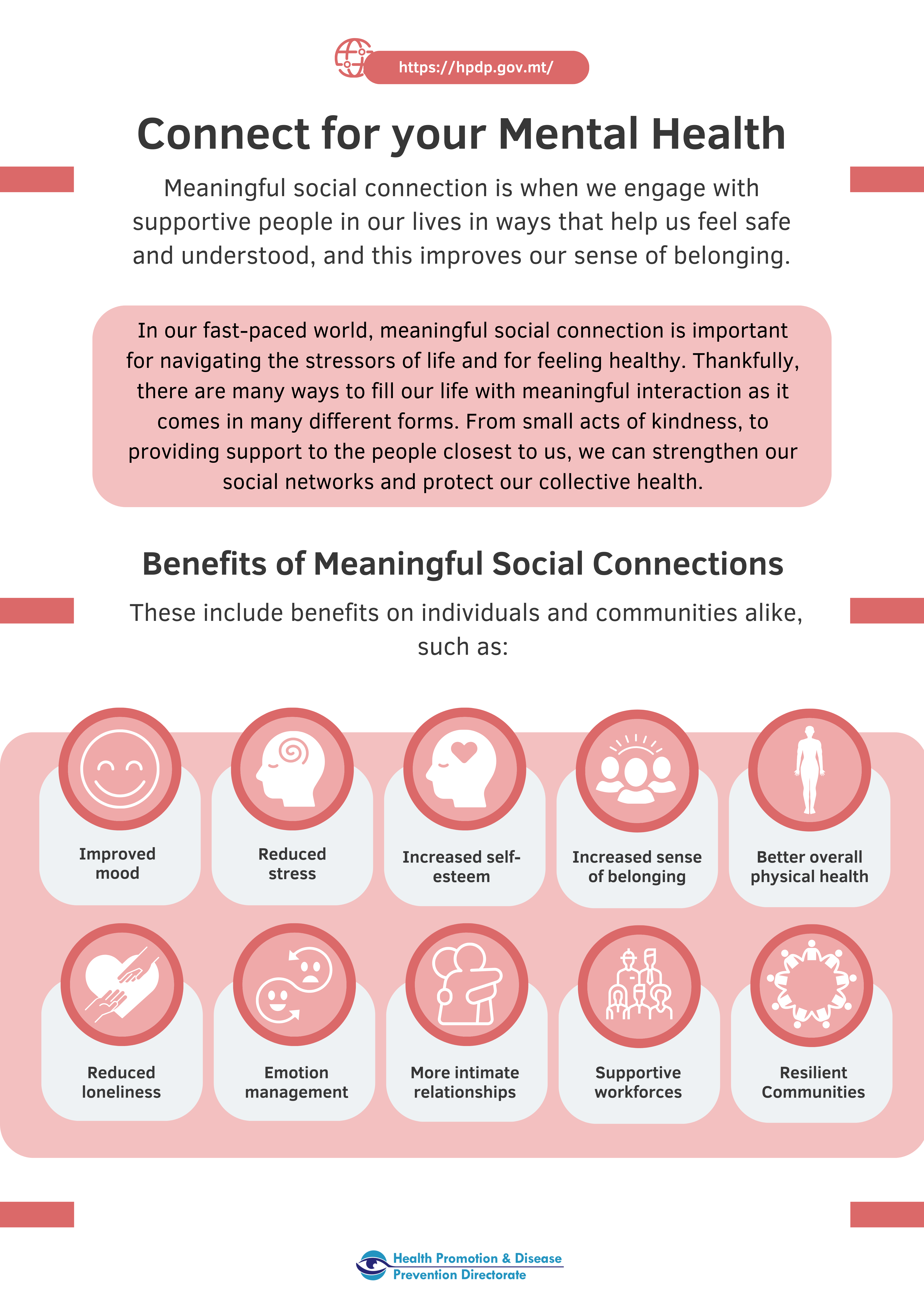Access our easy read versions by clicking your preferred language below!
English / Maltese

Connect for your Mental Health
Meaningful social connection is when we engage with supportive people in our lives in ways that help us feel safe and understood, and this improves our sense of belonging.
In our fast-paced world, meaningful social connection is important for navigating the stressors of life and for feeling healthy. Thankfully, there are many ways to fill our life with meaningful interaction as it comes in many different forms. From small acts of kindness, to providing support to the people closest to us, we can strengthen our social networks and protect our collective health.
Benefits of Connecting with others
These include benefits on individuals and communities alike, such as:
- Improved mood
- Reduced stress
- Increased self-esteem
- Increased sense of belonging
- Better overall physical health
- Reduced loneliness
- Emotion management
- More intimate relationships
- Supportive workforces
- Resilience communities
When we do something kind, our brains release feel-good hormones like dopamine and oxytocin, which boost our mood and well-being. It’s a simple way to bring more happiness into our lives. Acts of kindness can also lower our stress hormone, cortisol! This means that being kind can help us feel less stressed and more at ease. When we engage in acts of kindness, we inspire others to do the same, creating a positive cycle of compassion and generosity.
When we connect with others on a deeper level, it provides an outlet for expressing our emotions, and feeling supported or validated in this way can help us to reduce stress and manage our emotions better. Building genuine connections helps us feel like we belong and have support, and can reduce feelings of loneliness. Communities built on kindness and connection are more cohesive, resilient, and supportive, leading to a happier and healthier society as a whole.
Tips for Showing Kindness:
Cultivating kindness as a habit will help to create a positive ripple effect in your social circles, community, and beyond.
Kindness can be defined as the quality of being friendly, considerate, and generous towards others. It encompasses a range of behaviours and attitudes that promote positive interactions and well-being.
Here are some practical tips and suggestions to help you cultivate kindness as a habit:
- Start with self-kindness: Treat yourself with the same care and understanding you would extend to others. Take time for self-care, engage in activities that bring you joy, and practice self-acceptance.
- Practice gratitude: Cultivate a grateful mindset by expressing appreciation for the people, things and experiences in your life. Write thank-you notes, express verbally, or keep a gratitude journal to remind you of the blessings in your life.
- Perform random acts of kindness: Kind gestures can be simple but they have the power to brighten someone's day and create a ripple effect of positivity. Try some of our ideas by clicking here!
- Volunteer your time: Find local opportunities that align with your interests, values and skills. Giving your time to a worthy cause can have a profound impact on both you and those you serve.
- Provide meaningful support: Be attentive to the needs of others and offer support in meaningful ways. It could be lending a listening ear, or helping a friend or colleague with a difficult task.
- Spread kindness online: Use social media as a platform for spreading kindness. Share uplifting and positive content, leave encouraging comments, and support causes or initiatives that promote positive change. Use your online presence to uplift and inspire others.
Building Meaningful Connections:
It can be difficult to connect with people sometimes, especially when we're busy, stressed, or feeling low. Still, keeping in close contact with others can help us feel healthier and happier.
Here are some simple tips that could help build connections that are safe, supportive, and enriching.
- Listen actively to others – Get away from screens, lean into the conversation, encourage the other person to elaborate, and come up with different ways to boost the conversation's enthusiasm. This leads to conversations that go beyond what is at the surface.
- Provide support to others. This can either be practical support (like helping someone with their errands) or emotional support (listening to them when they need an ear).
- Reach out for support when times are tough. Having social connections helps us to manage our stress and better navigate life's challenges. Therefore, remember that all you have to do sometimes is reach out for support.
- Seek new connections – Be willing to try new things. Join a club that focuses on the activities you enjoy, or a class to build a skill you've been wanting to build for some time. You could also find joining a charitable cause to be interesting.
- Don’t be afraid to be authentic: Don't be afraid to let your true colours shine. There will always be people who understand you and wish the best for you so try your best to be authentic. The rest will follow.
Don't forget: With such busy lifestyles, it is important to make the time to check in on the people we love, to share how much we appreciate them, and to schedule in quality time with them to keep our connections strong.
Have a look at our page on loneliness by clicking here .
